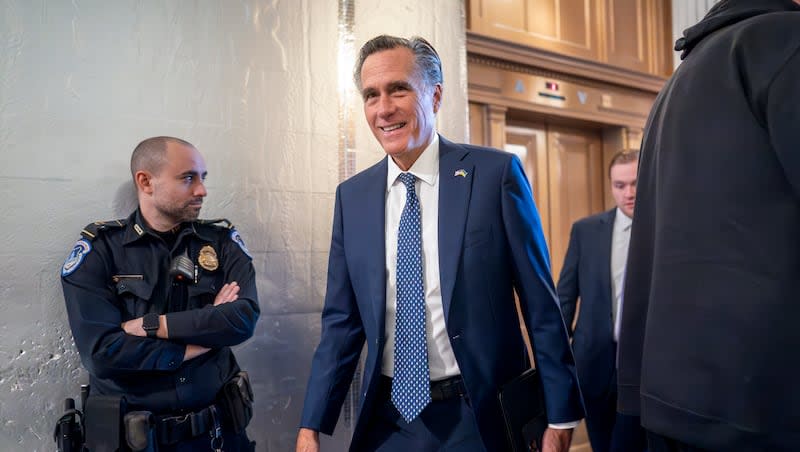Sen. Mitt Romney doubles down on need for Ukraine aid, while House GOP prioritizes border security

- Oops!Something went wrong.Please try again later.
- Oops!Something went wrong.Please try again later.
Utah Sen. Mitt Romney, in his appearance on “The Source with Kaitlan Collins” last week warned of the dangers that come with not backing Ukraine, while the House is prioritizing border security before foreign aid.
Touching on the retirement news of Senate Minority Leader Mitch McConnell, R-Ky., on Thursday, host Kaitlan Collins described the leader as “out of step with the majority of the Republican Party on national security,” before asking Romney how the GOP position on foreign policy has evolved.
In his response, Romney, R-Utah, said he believed a majority of his Republican colleagues think the U.S. “should play an active role in the world” and “defend freedom.”
According to Romney, if a standalone bill to send military aid to Ukraine was introduced on the Senate floor, a large number of GOP senators would vote in favor of it. Romney noted the source of the discontent was monetary support for the Ukrainian government. “But I think the majority of our group feels that we are better off in America if we defend the cause of freedom around the world,” he added.
If Congress doesn’t approve aid to Ukraine, the Eastern European country will struggle to preserve its “geographic integrity and life,” as Russia runs across Ukraine, Romney said. This move will also single Europe to not jump to help Washington, D.C., on matters of foreign affairs, he added.
“We’re strong globally in part because of our friends,” he said. “And if we don’t stand with our friends, we will lose strength and that will ultimately come to hurt us.” But not all of Romney’s colleagues are on the same page as him.
Sen. J.D. Vance, the loud anti-Ukraine aid critic
Collins asked Romney if he disagreed with Sen. J.D. Vance, R-Ohio, a vocal critic of Ukraine aid who argued sending $61 billion wouldn’t change Kyiv’s position on the battlefield.
Romney said while Vance made “an interesting point,” he said it was “irrelevant.”
“It may not change their stance on the battlefield. What it does do is communicate to the entire world that we honor our commitments,” he added. “If we cede leadership, if we’re no longer the leader of the free world, if we’re no longer the arsenal of democracy, then the world is going to look for different leaders.”
Romney said China would be happy to step into this leadership role, but it would create “a very dangerous world, not good for America, not good for our businesses, for our economy, but certainly not good for our freedom.”
On Sunday, Vance, in an appearance on Fox News’ “Sunday Morning Futures,” characterized his colleagues as “obsessed” with the war in Ukraine.
“Well, I think it’s so shameful… that you have all of these people whose job it is to look after the American people and to lead this country, but they’re obsessed with Eastern Europe and with Ukraine,” Vance said, as The Hill reported. “Look, we have terrible problems because of our border. We have the fentanyl problem, the sex-trafficking problem.”
Vance’s comments were in response to the remarks made by Senate Majority Leader Chuck Schumer, D-N.Y., after Schumer met with President Joe Biden and Vice President Kamala Harris as well as other congressional leaders, including House Speaker Mike Johnson, R-La., in the Oval Office last week.
“The meeting on Ukraine was one of the most intense I’ve ever encountered in my many meetings in the Oval Office,” Schumer said. If Ukraine loses the war, it could fracture NATO allies while empowering “the boldest autocrats of the world,” he said.
Vance called Schumer’s statement “disgraceful,” adding, “By the way … credit to Mike Johnson for being the one person in that meeting who’s standing there saying, ‘We have got to put the interest of our own citizens first.”
Will Congress authorize aid for Ukraine?
The Senate passed a $95 billion bipartisan aid package in February. At the time, it earned strong opposition from a group of lawmakers, including Sen. Mike Lee, R-Utah, who extensively spoke on the Senate floor to derail the bill from passing, as the Deseret News previously reported.
This package includes roughly $60 billion for Ukraine, $14.1 billion for Israel, $9.5 billion in humanitarian assistance, and additional funds for the Indo-Pacific, as well as $7.2 billion for the border.
In the House, GOP representatives declared the bill “dead on arrival” since the border related provisions didn’t go far enough. Johnson has not introduced the package to the House floor yet, nor has he committed to planning a vote. For now, congressional lawmakers are focused on finalizing 12 spending bills ahead of the March 8 and March 22 deadlines to avoid a government shutdown.
But, behind the scenes, the House GOP is drafting a new bill with stricter border provisions, as CNN reported. These efforts are led by House Foreign Affairs chairman Michael McCaul, R-Texas, and are set to be complete in the next two months.
This working proposal would provide only military aid, but no humanitarian aid. It would also reinstate the Trump-era “Remain in Mexico” policy, where the U.S. partnered with Mexico to keep migrants on the other side of the U.S.-Mexico border during the entirety of their immigration proceedings.

